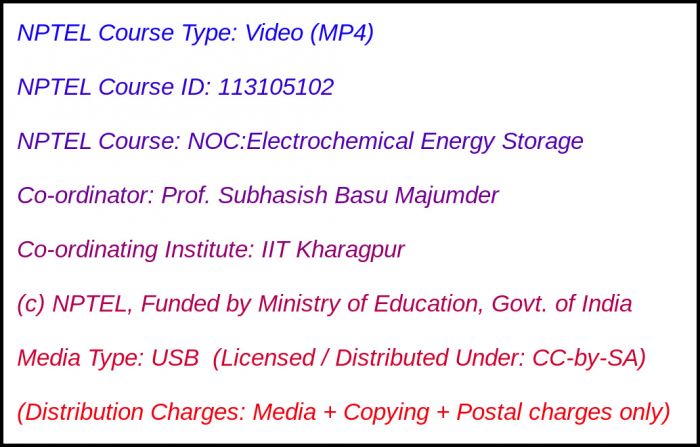
Media Storage Type : 32 GB USB Stick
NPTEL Subject Matter Expert : Prof. Subhasish Basu Majumder
NPTEL Co-ordinating Institute : IIT Kharagpur
NPTEL Lecture Count : 60
NPTEL Course Size : 6.3 GB
NPTEL PDF Text Transcription : Available and Included
NPTEL Subtitle Transcription : Available and Included (SRT)
Lecture Titles:
Lecture 1 - Fundamentals of electrochemistry, definition of primary and secondary batteries
Lecture 2 - Primary batteries and Secondary batteries
Lecture 3 - Supercapacitors
Lecture 4 - Concepts of thermodynamics pertinent to electrochemical cells
Lecture 5 - Kinetics of electrochemical cells and structural characteristics of electrodes
Lecture 6 - Introduction to EMF, redox potential, Faraday law and Nernst’s law
Lecture 7 - Terminology related to secondary battery : half-cell,full-cell, redox couple,positive
Lecture 8 - Measurements: Cyclic voltammetry, nominal voltage, capacity, rate performance
Lecture 9 - Impedance spectroscopy measurement and analyses
Lecture 10 - Measurement of rechargeable cell: Case study
Lecture 11 - History and categories of lithium batteries
Lecture 12 - Operational mechanisms for lithium batteries: Intercalation materials, alloys
Lecture 13 - Differences of voltage profiles between intercalation materials, alloys, and conversion
Lecture 14 - Properties of electrode materials (Case study: alloy as anode)
Lecture 15 - Properties of electrode materials (conversion type oxide as case study)
Lecture 16 - Positive electrodes: Lithiated transition metal oxides, lithiated iron oxyphosphates etc
Lecture 17 - Negative electrodes: Carbonaceous materials, lithium titanium oxides etc
Lecture 18 - Electrolyte :Liquid Electrolyte, Polymer Electrolyte
Lecture 19 - Current Collector, Conductive Agents, Separator and Other Accessories
Lecture 20 - Novel materials for lithium ion rechargeable cells
Lecture 21 - Principle of Operation of Commerical Cells : viz. C - NMC, C - NCA etc
Lecture 22 - Principle of operation of commercial cells
Lecture 23 - Major characteristics of commercial Li ion cells: Cell performance,degradation phenomena
Lecture 24 - Fabrication of Li ion cell: Cylindrical configuration
Lecture 25 - Fabrication of Li ion cell: Pouch and prismatic cell
Lecture 26 - Positive electrodes: Layered oxide, polyanionic compounds (phosphates, sulphates etc)
Lecture 27 - Negative electrodes: Carbonaceous materials, alloy based and other materials
Lecture 28 - Electrolytes: Roles and requirements, organic electrolyte, ionic liquid electrolyte
Lecture 29 - Performance of Na ion rechargeable cell
Lecture 30 - Future perspective of Na ion cells
Lecture 31 - Introduction to battery module, BMS, thermal management and pack design
Lecture 32 - Degradation and safety issues of Li ion rechargeable cells
Lecture 33 - Introduction to battery management system: BMS topologies, hardware, concept of active
Lecture 34 - Introduction to thermal management: Active thermal management system, passive thermal
Lecture 35 - Packaging of battery pack and battery testing: Material selection, sealing of enclosure
Lecture 36 - Classification of supercapacitors: EDLC and pseudocapacitative type
Lecture 37 - Pseudocapacitor
Lecture 38 - Asymmetric supercapacitor and BATCAP: Battery supercapacitor hybrid electrochemical
Lecture 39 - Electrolytes for supercapacitors: Aqueous/organic liquid electrolytes/ionic liquid
Lecture 40 - Current collectors, separators etc. and their effect on performance
Lecture 41 - Operational principles of aqueous and Li - O2 batteries
Lecture 42 - Electrolytes for Li - O2 batteries
Lecture 43 - Limitations of Li - Air batteries
Lecture 44 - State of the art Li - Air batteries : Carbonaceous materials
Lecture 45 - State of the art Li - Air batteries: Case study
Lecture 46 - The element sulfur, principle of operation
Lecture 47 - Advantages and disadvantages of Li - S batteries, positive electrodes
Lecture 48 - Electrolyte and negative electrode for Li - S battery
Lecture 49 - State of the art Li - S batteries : Case study - I
Lecture 50 - State of the art Li - S batteries : Case study - II
Lecture 51 - Global Geographic Distribution of Raw Lithium Resources
Lecture 52 - Nature and geological origin of all potential lithium resources
Lecture 53 - State of the art extraction techniques and known production reserves
Lecture 54 - Recycling of lithium and other battery constituents from used battery
Lecture 55 - Recycling of lithium and other battery constituents from used battery (Continued...)
Lecture 56 - Lead Acid Batteries: Operational principles, main characteristics and applications
Lecture 57 - Lead Acid Batteries: Operational principles, main characteristics and applications (Continued...)
Lecture 58 - Ni-Cd and Ni-MeH Batteries: Operational principles, main characteristics and applications
Lecture 59 - Redox flow battery vanadium redox battery,operational principle, and main characteristics
Lecture 60 - Other Redox Flow Battery Technologies

